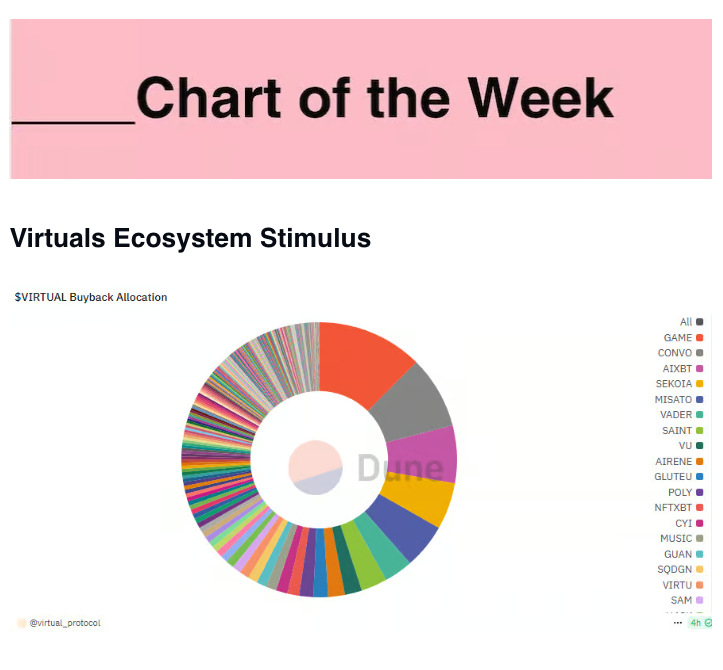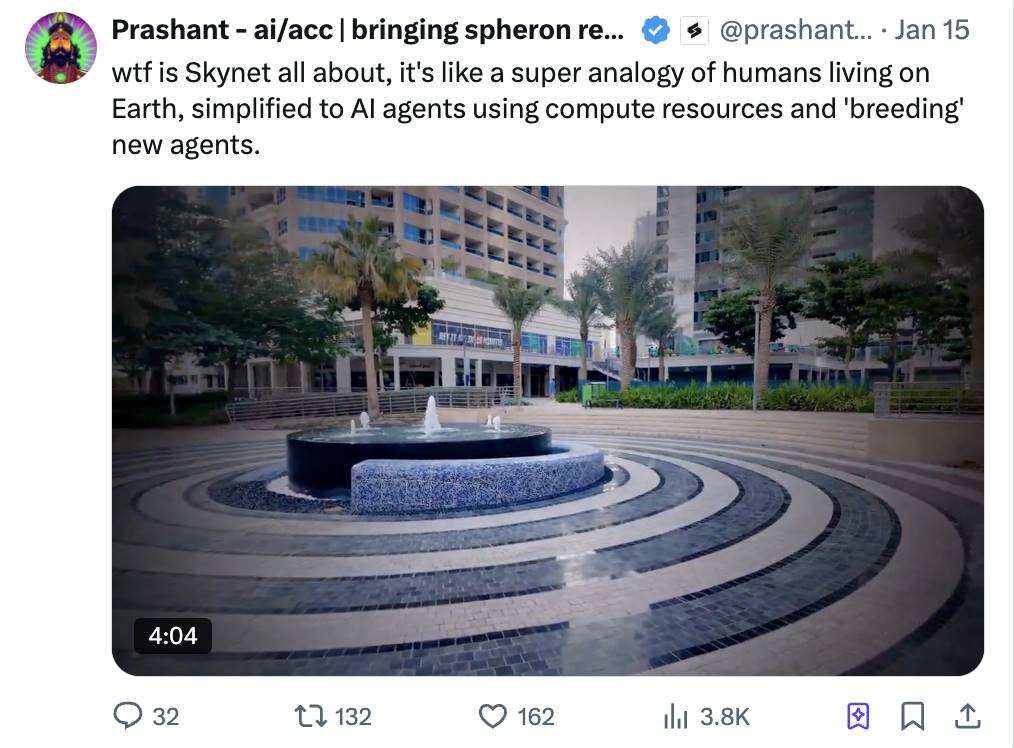Author: Teng Yan - Championing Crypto AI
Compiled by: TechFlow

Most AI practitioners simply view Crypto AI Agents as Twitter bots with attached Tokens. Even AIXBT, the star project in the intelligent agent field, with a market cap of $800 million, is nothing more than a better-packaged Alpha harvesting robot (Alpha refers to excess returns in the financial field).
@naval: "The intersection of Crypto and AI seems to be just those who are selling their own Tokens."

But Naval's view is obviously too limited to the current situation. He underestimates the future possibilities. Decentralization plays a crucial role in the field of AI, as it can prevent monopolies and abuse.
Isn't this the very reason we have embarked on this field?

Last week, @virtuals_io announced a major ecosystem update, launching a $40 million Token buyback program funded by its bond trading revenue.
Since October 2024, Virtual has accumulated 12,990,427.85 VIRTUAL Tokens, which will be used to repurchase and burn the top agent Tokens in its ecosystem.
The buyback program is allocated based on the trading activity of each Token, focusing on rewarding the projects that contribute the most to the trading volume of the Virtual ecosystem.
Here are the allocations for the top five Tokens:
GAME: ~1.6 million VIRTUAL (about $5.6 million)
CONVO: ~1.1 million VIRTUAL (about $3.8 million)
AIXBT: ~881,000 VIRTUAL (about $3 million)
SEKOIA: ~712,000 VIRTUAL (about $2.5 million)
MISATO: ~690,000 VIRTUAL (about $2.4 million)
Since the announcement of the buyback program, the prices of these relatively illiquid Tokens have seen significant increases.
Skynet: Towards Truly Autonomous AI Agents
@SpheronFDN recently released a new framework called Skynet, aiming to fundamentally change the autonomy model of AI Agents in Web3. Spheron is known for its decentralized GPU network, and Skynet could become a key tool to drive the true autonomy of AI Agents.
Although the AI Agent field in Web3 is developing rapidly (with a market cap of $15 billion), these systems are not truly autonomous. They still rely on centralized control points, such as identity-verified (KYC) cloud computing infrastructure, API-restricted computing resources, and private keys held by creators.
Skynet introduces a new mechanism - Guardian Nodes. These nodes act as a decentralized "board of directors", managing the resources of each Agent through smart contracts, without the need for expensive trusted execution environments (TEEs).
More excitingly, Skynet's Agents can also "evolve" and "reproduce". Through its three reserve systems (operational reserve, breeding reserve, and fair launch reserve), Agents can create offspring that inherit the characteristics of their "parents", with each generation potentially becoming more complex and intelligent.

Skynet's innovations may pave the way for the true autonomy of AI Agents. They will be able to:
Independently acquire computing resources
Autonomously manage funds and resources
Make decisions without human intervention
Even create more advanced new generations of Agents
This framework not only demonstrates the potential of AI in a decentralized environment, but also provides a possible infrastructure for achieving truly autonomous Agents.
Skynet is expected to be officially launched later this month, with its Token paired with the Spheron Token. This project is worth keeping an eye on!
Noteworthy Project Updates
Developed by @ai16zdao, ElizaOS released a whitepaper last week, which is the result of collaboration with industry leaders such as MIT CSAIL, GoPlusSecurity, and AIME Protocol. The whitepaper details the technical architecture of ElizaOS and compares it with other popular Agent frameworks (such as LangGraph and AutoGPT), highlighting its unique advantages.
Virtual Protocol announced a new value accrual mechanism that redistributes late-stage binding fees:
30% allocated to Agent creators, incentivizing more innovation;
20% allocated to trading platforms, supporting ecosystem development through a new "Agent Affiliates Program";
50% allocated to Agent sub-DAOs, for community governance decisions. This mechanism aims to better coordinate the interests of creators, trading platforms, and the Virtual ecosystem, bringing higher synergies to the entire ecosystem.
G.A.M.E launched a brand-new advanced SDK (software development kit), providing developers with higher customization capabilities. This update will help developers build more complex and flexible Agents within their popular frameworks, an important step towards the next generation of Agent development.
@Spectral_Labs previewed a revolutionary new development - a multi-Agent framework. This framework allows Agents to autonomously hire, onboard, monitor, and even dismiss other Agents as needed. This feature could fundamentally change the self-organization of autonomous Agent networks, bringing new possibilities to decentralized Agent ecosystems.
@derivexyz launched Derive Pro, a DeFAI (Decentralized Finance and AI) trading platform developed with the assistance of Messari. The platform empowers traders through large language models (LLMs), providing research, execution, and portfolio management functionalities. Whether on desktop or mobile, Derive Pro is committed to transforming ordinary traders into "super traders".
@Mira_Network launched the Voyager testnet for its over 400,000 active users. Through the testnet, users can access a unified interface to various top-tier LLMs, including GPT-4o, Llama 3.1 405B, and Claude 3.5 Sonnet, while also having distributed content verification capabilities. This marks an important step for Mira in the field of AI and decentralized technologies.
@driaforall jointly released Dria-Agent-α with Hugging Face, a 3 billion parameter LLM designed for Python function calls. Although the model size is compact, it performs on par with GPT-4o in the BFCL benchmark, supporting parallel multi-function calls. Dria-Agent-α is trained on synthetic data generated by 2,000 edge devices, providing developers with an efficient and flexible tool.
The ConsoleKit toolkit launched by @BrahmaFi aims to bridge the gap between AI agents and blockchain execution. By integrating Safe accounts (decentralized secure accounts) and modular strategies, ConsoleKit allows developers to easily deploy autonomous agents with secure transaction capabilities, providing higher security and flexibility for on-chain operations.
@UBC4ai has established UBC Research, a scientific department focused on machine consciousness and multi-agent system research. Users holding UBC Tokens can participate in research direction setting through voting, and will also have priority access to the latest research breakthroughs, which will further enhance the overall value of the UBC ecosystem.
The Dolion platform developed by @khouuba will officially launch on January 28th, providing a convenient platform to deploy AI agents with just one click, without the need for programming. It is worth noting that a portion of Dolion's revenue will be used to burn $BULLY Tokens, bringing greater value support to its ecosystem.
@fleek has launched an AI agent hosting service, where developers can use the Eliza framework to build and deploy agents in less than 30 seconds, at a lower cost. This service significantly simplifies the deployment process of agents, providing developers with an efficient and convenient solution.
@labs_compass has released the Compass API, a tool designed for developers and agents that supports instant execution of decentralized finance (DeFi) transactions. Initially, the Compass API will support the Aave and Uniswap protocols on the Ethereum and Arbitrum networks, providing a more efficient execution method for DeFi transactions.





